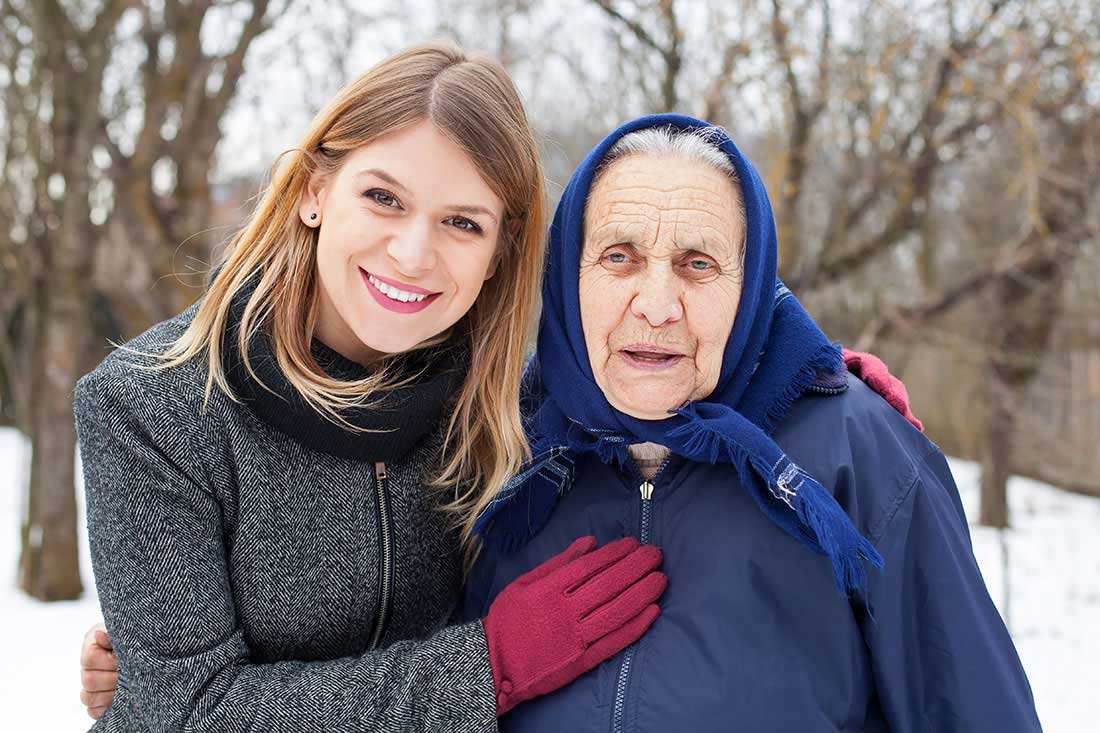Winterization 101 For Seniors

The frosty mornings of mid-to-late fall are the perfect time to plan safety strategies you can implement for the coming winter months that can be particularly hazardous for the elderly. Brittle bones and weakened immune systems are tempting targets for the dangers of seasonal winter maladies, whether from viral and bacterial infections that are easily transferred from common places we all touch, such as doorknobs and restroom faucets or through airborne transmissions such as coughs and sneezes.
Equally daunting is being caught unprotected in the cold for an extended period of time, resulting in frostbite. A fall on the ice can result in broken bones and the older the bones, the greater the probability that they will not repair and heal.
Seniors feel cold more intensely than their younger counterparts and use various means to stay warm. Ill-placed electric heaters are a fire hazard, while unsupervised heating pads can result in serious burns to thin, tender skin.
We all know an independent grandmother, grandfather, or elderly friend who believes they’re as strong as they were in their 50’s, shoveling snow and braving the elements to walk to the mailbox or the corner grocer. 20/20 vision cannot spot “black ice” and neither can a senior’s fading eyesight.
Breathing disorders are more noticeable (and sometimes triggered) by a drop in temperatures, so a senior’s exposure to the elements should be minimal (if at all) when temperatures drop.
While all of the above may sound like “doom and gloom”, there are a few simple strategies you can put in place to ensure winter safety for your senior!
Practical prevention of winter’s woes:
- Seniors should have someone check-in on them periodically.
A daily call or visit, whether from family members or the Meals-on-Wheels volunteer is essential during winter months. - Are flu and/or pneumonia shots are up to date?
Have a supply of throat lozenges, nasal decongestants, cough syrup, teas and soups on hand. - Does your senior have thermal clothing and warm blankets? Winter boots? Gloves? A winter weight coat?
Check electrical heaters and other appliances to ensure they’re operating correctly. Check that cords are not frayed or if there are multiple units plugged into outlets. Heating appliances should be plugged directly into a wall outlet, not into a power strip. - Have rock salt readily available near all entry and exit areas in an easy-to-access container. Liberally sprinkle over shoveled sidewalks and slick areas.
- Are medications well-stocked?
- Arrange for laundry service and help with house-cleaning.
- Arrange for rides to and from doctors’ appointments, grocery shopping, and other errands.
- Can the senior open his/her own containers of soup/dairy products, etc.?
Sometimes loosening a jar will prevent injuries to wrists and help in avoiding spills. An electric can opener may be helpful. - Many seniors are quite capable of self-care and their homes, but during winter weather some daily tasks become hazardous and chores that were once easily accomplished become enormous obstacles that can be avoided by practicing preparedness. Many seniors won’t want to impose on your kindness and then end up sick and/or injured.
Adding a dose of TLC when visiting seniors will warm both of your hearts–and keep “Ol’ Man Winter” at bay!


